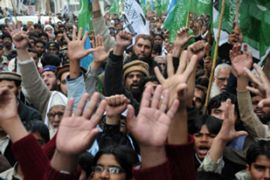Scores arrested in Pakistan raids
Officials announce sweeping crackdown on suspects linked to Mumbai attacks.

Among those detained in the crackdown was Hafiz Mohammed Saeed, the head of Jamaat-ud-Dawa, along with two other men, Zaki-ur-Rehman Lakhvi and Zarrar Shah, who India has accused of planning the Mumbai attacks.
‘Training camps’
 |
| The Mumbai attacks have increased tensions between Pakistan and India [AFP] |
The interior ministry said the crackdown had also closed 20 offices, 94 schools, two libraries and six websites linked to the charity.
It said more than a dozen relief camps run by the charity had also been closed down after they were alleged to be doubling as training grounds for fighters.
However, a senior Pakistani official told the Associated Press the authorities needed to further investigate information about the attacks provided by India before it could be used to prosecute any suspects in court.
On January 5, India gave Pakistan a dossier of evidence including information on interrogations, weapons and data obtained from satellite phones used by the Mumbai attackers.
India said the material proved that Pakistan-based fighters plotted and executed the attacks and has repeatedly insinuated that Pakistani intelligence agents were involved.
Islamabad denies that, though it has accepted Indian claims that Mohammed Ajmal Kasab, the one suspected Mumbai attacker captured alive is a Pakistani national.
The siege of India’s financial capital, which lasted almost three days and left at least 179 people dead, has led to increased tensions between the nuclear-armed neighbours.
Pressure on Pakistan
Speaking to reporters on Thursday, Rehman Malik, a senior interior ministry official, said Pakistani detectives would “inquire into'” the information provided by India “to try to transform it to evidence, evidence which can stand the test of any court in the world and of course our own court of law”.
However, he appeared to rule out handing over suspects to India, saying that Pakistan’s own laws allowed for the prosecution of citizens who committed crimes elsewhere.
Islamabad has faced growing pressure to clamp down on Lashkar-e-Taiba in the wake of the Mumbai siege.
Days after the attacks, the UN Security Council declared that Jamaat-ud-Dawa, was a front for the Lashkar-e-Taiba.
India says Pakistan has used Lashkar-e-Taiba in the past as a proxy force against India in their struggle over the divided Kashmir region.